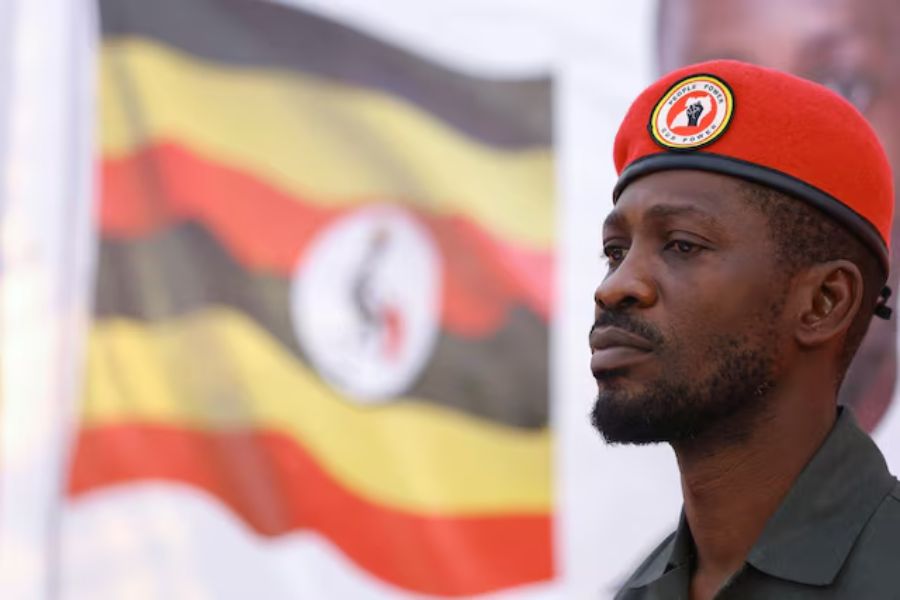Ugandan opposition leader and pop star Bobi Wine announced Friday his intention to challenge President Yoweri Museveni in the 2026 presidential elections. Wine vows to confront what he describes as “gross human rights violations” under Museveni’s rule. Wine also criticized Western governments for turning a blind eye to abuses in exchange for lucrative business opportunities in the East African nation.
Wine, 43, whose real name is Robert Kyagulanyi, is no stranger to Uganda’s fraught political landscape. He first contested the presidency in 2021, capturing the imagination of many young Ugandans but ultimately losing to Museveni in a race marred by allegations of fraud, intimidation, and violence against opposition supporters. He rejected the outcome, accusing the government of widespread ballot stuffing and voter intimidation—a charge the government and electoral commission vehemently denied.
Speaking to Reuters in Nairobi on Friday, Wine confirmed he would again seek the country’s highest office in January’s elections. “Yes, I’ve expressed my availability on behalf of my team,” he said. “It’s not just about me. It’s about the people of Uganda and their desire to free themselves from decades of oppression.”
Wine framed his candidacy as a political contest and a moral stand against Museveni’s authoritarian regime. “Participation in the election is not only about winning votes,” he said. “It’s a fighting opportunity to further undress and expose the regime and to galvanize the people of Uganda further to rise and free themselves.”
President Museveni, now 80, has been in power since 1986, making him one of Africa’s longest-serving leaders. Rights groups have long accused his government of cracking down on dissent, stifling the press, and using security forces to intimidate political opponents. In recent years, reports of abductions, illegal detentions, and torture of opposition supporters have increased, fueling tensions in the country ahead of the next elections.
Wine said he has personally witnessed the suffering of his supporters. He cited the case of Eddie Mutwe, his bodyguard and a prominent activist in his National Unity Platform (NUP) party, who disappeared for a week before being produced in court on Monday, charged with robbery and remanded in custody. According to Wine, Mutwe told him he had been electrocuted, waterboarded, and beaten during his captivity.
“Eddie narrated to me how he was tortured—electric shocks, waterboarding, beatings,” Wine said. “This is the reality for many of our supporters who dare to speak up or even associate with us.”
Uganda’s justice minister confirmed this week that Mutwe appeared to have been tortured while in custody. The case took a bizarre turn when Museveni’s son, Muhoozi Kainerugaba, the head of the Ugandan military, publicly admitted on social media that he had detained Mutwe in his basement, using him as a “punching bag.” The statement sparked outrage among human rights groups, who demanded accountability and an independent investigation into the allegations.
Despite repeated attempts by Reuters to contact Uganda’s police spokesperson and the defense forces for comment, neither responded to questions regarding the allegations.
Wine’s condemnation, however, was not reserved for the Ugandan government alone. He aimed sharp criticism at Western countries, accusing them of prioritizing economic and security interests over human rights. “Some leaders in the West are complicit in our suffering,” he said. “They are here to crack their business deals and don’t care about human rights. If they truly stood for the values they profess—freedom, democracy, human dignity—they would be castigating these gross human rights violations.”
Uganda is considered a key Western ally in the fight against regional jihadist groups and has contributed troops to regional peacekeeping efforts, including in Somalia. Analysts say this strategic partnership has often shielded Uganda from harsh criticism over its human rights record.
For many Ugandans, Wine’s candidacy symbolizes a generational shift. Known for his roots in the slums of Kampala and his music that often champions social justice, Wine has attracted a significant following among the country’s youth, who comprise most of Uganda’s population. His National Unity Platform has become the most significant opposition force, despite facing severe repression, including arrests of party members and bans on political gatherings.
Wine’s campaign platform promises to restore political and civil rights, tackle corruption, and improve governance. “Our priority is to return power to the people,” he declared. “We must end the culture of impunity that allows a few to enrich themselves while millions remain in poverty.”
The road to the 2026 elections, however, will not be easy. Uganda’s parliament recently passed an amended law allowing military courts to try civilians—a practice the Supreme Court had previously ruled unconstitutional. Opposition parties and rights activists warn that this measure could be used to target political opponents and activists ahead of the vote.
Rights groups have also warned that security forces could intensify their crackdowns on opposition rallies, using COVID-19 or security concerns as a pretext to restrict political activity. In previous elections, opposition candidates have faced frequent arrests, media blackouts, and restrictions on their movement, raising concerns about the fairness of the electoral process.
As Uganda moves closer to the January elections, the international community will closely watch whether the elections will be free, fair, and credible—a test of the country’s commitment to democratic principles. Wine, for his part, remains defiant. “We will not give up,” he said. “The people of Uganda deserve better, and we will keep fighting for our freedom, no matter the cost.”
Wine’s announcement has already sparked debate among political analysts, with some predicting a tense and potentially violent electoral campaign season. Despite the risks, Wine insists that the fight is worth it. “Freedom is not given,” he said. “It is taken. And we will take it—peacefully, but forcefully.”
As the campaign season kicks off, Uganda braces for a high-stakes contest that could shape the nation’s future for years to come. Whether Wine’s bid will succeed remains uncertain, but one thing is clear: the fight for Uganda’s democracy is far from over.


